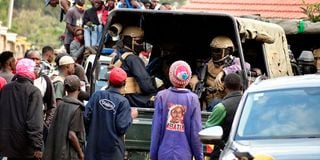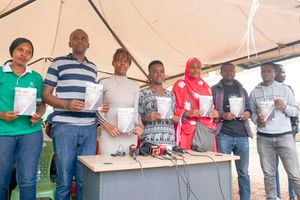
Volunteer youth help to recover a human body dumped in the Kware area in Pipeline, Nairobi, on July 12, 2024.
Mukuru kwa Njenga in Embakasi South, Nairobi, remains a community in turmoil, grappling with unresolved mysteries of the bodies found in Kware, socio-economic inequalities and the devastation of lost homes and livelihoods.
In July 2024, Mukuru kwa Njenga drew national attention with the discovery of dismembered human bodies at the Kware dumping site. The bodies retrieval exercise, for some days brought life in the settlement to a halt.
For the residents, the quarry is a source of trauma, likened to living near a mortuary with the persistent stench of death. The chaotic initial retrieval process, led by community volunteers due to government inaction, left many—especially youth—deeply scarred.
The operation was poorly managed, says Anami Daudi Toure of the Mukuru Community Justice Centre (MCJC).
“Authorities left body retrieval to civil society groups and community volunteers... The scene was not treated as a criminal investigation, with no effort to preserve forensic evidence,” he says.
Although authorities later secured the site, they have since remained silent. Nearly six months on, the area is an unsecured crime scene. It has continued being a dumping ground, with industrial runoff, storm water and sewage filling its pits, highlighting the authorities’ failure, says Mr Toure.
He notes that the mishandling of the bodies retrieval worsened their condition, and the government’s promise of further searches remains unfulfilled.
According to Mr Duncan Muyale, a village elder in Milimani, Mukuru kwa Njenga, recent events have left local leaders like him grappling with questions and unrelenting challenges.
On July 15, 2024, Collins Jumaisi Khalusa, allegedly connected to the killings, was arrested. The Directorate of Criminal Investigations (DCI) claimed that Jumaisi confessed to murdering 42 women and dumping their bodies at Kware.
He appeared in Makadara Law Courts on July 16, where the DCI was granted a month to hold him to conclude investigations.
On August 16, three suspects—Jumaisi, Amos Momanyi and Moses Ongembo—were brought to court and charged with the murders of six women, the only victims identified among the 18 bodies recovered.
On August 20, Jumaisi mysteriously escaped from Gigiri Police Station, allegedly alongside 12 Eritreans.
“Since then, the mystery of Kware remains unsolved, deepening the community’s sense of fear and mistrust,” says Mr Muyale.
“Residents were told that a suspect, Jumaisi—a roadside hawker of SIM cards and mobile accessories—was arrested. Yet, none of his neighbours could corroborate claims of his involvement.”

Youths hang on to a police vehicle as it arrives at the City Mortuary reception area on July 13, 2024, to deliver bodies recovered from Kware area for forensic examination.
Mr Toure said the lack of proper investigations, the disappearance of the main suspect, and the mishandling of the crime scene,left serious doubt that victims and their families would get justice.
The MCJC’s report on the Kware tragedy exposes systemic failures in the justice system, criticising the State’s inability to identify victims or provide closure for their families.
“If the government can’t ensure justice for these people, why does it even exist?” asks Mr Toure. “These were human beings, not animals, dumped in Kware.”
The area suffers marginalisation and systemic neglect marked by bloody protests, poverty and unfulfilled promises. Earlier in 2024, residents protested against the high cost of living, increased taxes and contentious policies. Thousands took to the streets, demanding change. Yet, little has improved, notes Mr Muyale.
“Staples like maize flour remain unaffordable, and unpopular initiatives such as the Social Healthcare Authority (SHA) and higher fees for vital documents like birth certificates and national identification cards have been quietly implemented,” he says.
Many demonstrators were injured, jailed, or killed, with families receiving no justice or compensation.
“Those arrested often had to pay for their release, compounding the community’s frustration with a system they feel is rigged against them,” says Mr Toure.
He adds: “We documented these cases and provided medical and psycho-social support to the victims. Despite our efforts, organisational support for the injured has not materialised. We continue to follow up with the Independent Policing Oversight Authority and other government bodies, but no cases have been successfully resolved so far.”
In May, residents endured the pain of abrupt and brutal demolitions of their homes and businesses, sparking protests.
“The demolitions devastated the local economy. Businesses were forced to shut down or relocate, leaving residents without livelihoods,” Mr Muyale says. “Families who had called this land home for generations now face sleepless nights, battling court cases for compensation and fighting to prove their right to the land. Our forefathers lived and died here. It’s unimaginable that someone can come with documents and displace thousands of people without even listening to us.”
Attempts to resolve land issues through dialogue between the community and the government have yet to yield results.
“The government’s affordable housing agenda is far from people-centred,” Mr Toure says. “The high costs of these homes makes them inaccessible to low-income residents.”
Fire outbreaks in Mukuru kwa Njenga claimed at least 15 lives in 2024, yet investigations remain inconclusive. The community’s trust in law enforcement has eroded, leading some to turn to alternative justice methods, a trend Mr Toure says is dangerous.

DCI homicide detectives put sacks with human bodies recovered from the Kware dumpsite into body bags.
At the start of 2024, floods ravaged the slum, destroying businesses, homes, and roads. The floods amplified social injustices, particularly in-access to food and healthcare, says Mr Toure. “Evictions that followed targeted the poor living on riparian land, while big industries along rivers like Ngong and Mathare remained untouched.”
“The government had promised Sh10,000 in recovery funds per family, but most people never received it,” Mr Toure reveals. “Some families are still living in temporary shelters, waiting for promised resettlement.”
Though no clear plans have been communicated by the government, whispers of more demolitions have sparked widespread fear. Even Mr Muyale, a village elder, remains in the dark.
Public participation, a constitutional right in Kenya, has become largely symbolic. “The minutes recorded during these sessions never reflect what actually transpires, making public participation look like government agenda,” he explains.
Once owned by an Asian businessman, the Kware land has undergone significant transformation. Subdivided and sold to investors, it now boasts multimillion-shilling luxury apartments. On the other end, most residents live in makeshift mabati structures.
Mukuru kwa Njenga remains disconnected from public water systems and the national electricity grid. Access to clean water remains limited, and poor drainage systems exacerbate health risks. Mugging, burglary, femicide, and arson are on the rise, Mr Muyale says.
The area is served by only two government-run facilities: Mukuru Health Centre and Kware Health Centre, the latter being little more than a container stationed next to the dumping site.

Members of the public mill around a vehicle carrying officers from Recce Squad at Nairobi Funeral Home on July 13, 2024 where bodies recovered from Kware were taken for forensic investigations.
“Roads are another sore point—link roads like the one between Kwa Njenga and Sinai become impassable during rains, forcing schools to send children home early at the first sign of bad weather,” he adds.
Uncollected garbage litters the area, despite residents dutifully paying taxes. “It feels like the community has been abandoned, especially after the demolitions. The government only seems to remember us during election periods, when they promise new projects that never materialise,” he says.
The area’s dense population and high poverty levels have contributed to drug abuse, early pregnancies, and school dropouts. Embakasi South, which includes Kware and Njenga villages, has only five public primary schools, forcing many parents to turn to low-cost private schools.
Village elders have stepped up, conducting door-to-door campaigns to ensure the government’s policy of 100 per cent school transition is met. As a result, public schools in the area are often overcrowded.
Nairobi County’s Dishi na County feeding programme has been a rare bright spot. For just Sh5 per meal, school children receive balanced lunches, sometimes with a fruit. “This initiative is a blessing,” Mr Muyale notes. “It keeps children in school and helps families struggling with the high cost of living.”







